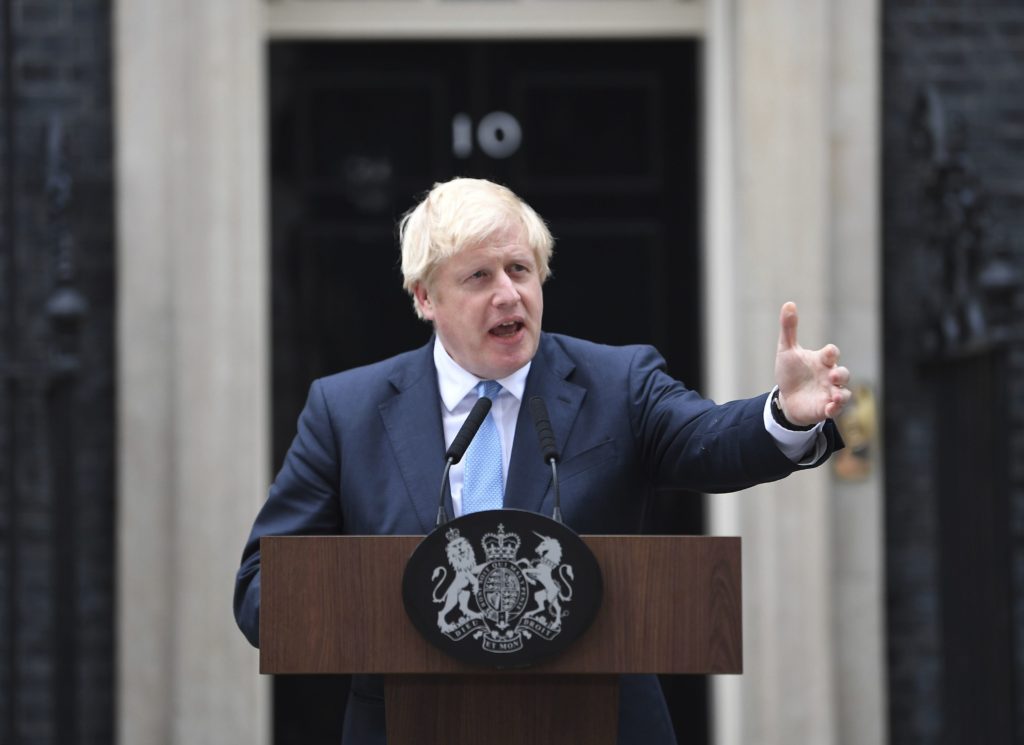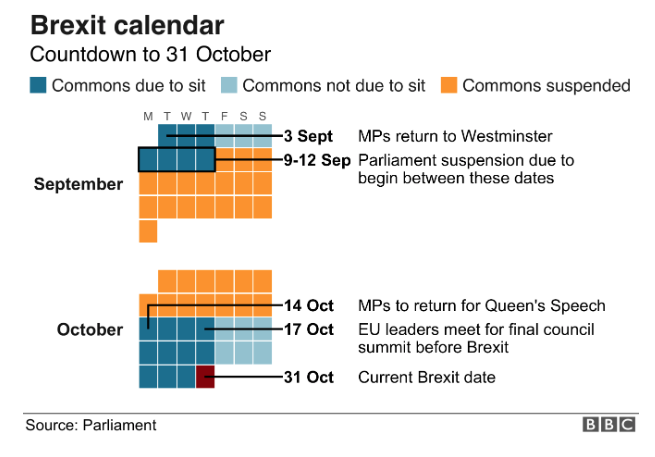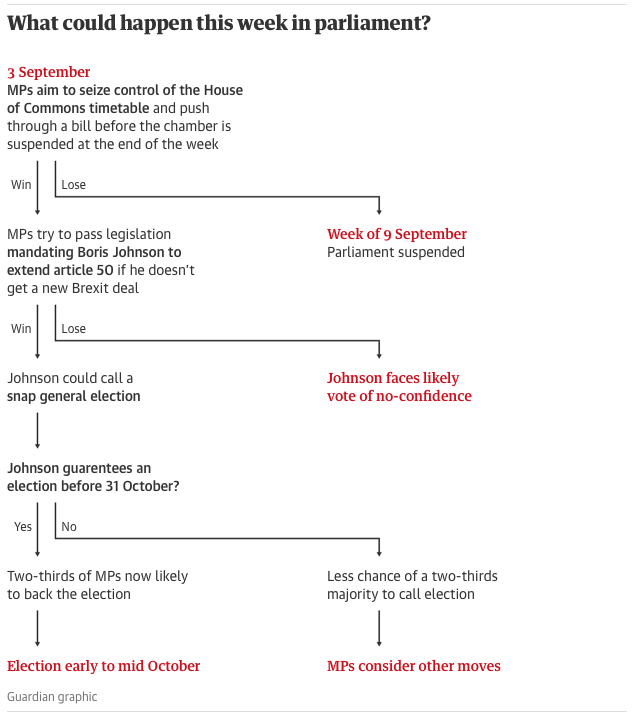British Politics: Options, Strategies, and Bull-headed Stupidity . . . In other words, an average Monday in 2019.

Yesterday afternoon, the news that an emergency cabinet meeting scheduled for 5PM (of this nascent government) and then a PM announcement in front of No. 10 for 6PM caught our attention. While proroguing Parliament is clearly a ploy to reduce the probability of parliamentary muddling with the government’s plan to crash out of the European Union without a deal (see calendar below), the sudden cabinet meetings and Prime Ministerial announcements strongly suggested that said strategy was not foolproof.

There is a distinct, yet complimentary interpretation of the prorogation gambit (Johnson is sacrificing the moral high ground in public opinion here) — that it infuriates the House of Commons enough that they call a Vote of No Confidence in his government, gifting him an election that he could claim to not want, and run the campaign on the side of the people against the perfidious parliamentarians, politicians, and other vested interests in the pocket of Europe. With this nascent, precarious government having a coherent strategy, and the initiative, why the sudden panic yesterday?
Likely because of this. (Yes, it’s a fire breather site. It may make you cringe, but it won’t hurt you):
Yesterday afternoon Hilary Benn published the text of his European Union (Withdrawal) (No. 6) Bill, launched with the support of a cross-party group including former Cabinet ministers Philip Hammond and David Gauke. We expect Speaker Bercow to grant an emergency ‘Standing Order No. 24’ debate today and allow a vote on an amendment to a bland motion that, if passed, would allow MPs to seize control of the Commons Order Paper to provide time to try and ram the Bill through the Commons in a day later this week.
Presumably, it’s the threat of the Benn bill, with its cross party support, that motivated the cabinet meeting and the damp squib of a Prime Ministerial speech last night (please support me, pretty please, or I’ll try to call an election). Given the Government has a working majority (including the 10 DUP MPs) of between zero and one, it’s not too surprising that Benn’s bill has a solid chance of passage:

Unless it has changed in the past few minutes, this afternoon or evening MPs will attempt to assume control of the Parliamentary timetable, which would then lead to legislation mandating a requested extension of Article 50 (assuming the EU plays along, of course; the British often forget that there are two parties to Brexit), with other steps in the process seen below:

The key questions are A) whether or not Johnson could be trusted to stick to a promised election date: 14 October is the date being mooted, but the date is completely in the hands of the Government, and it’s my understanding that once called it can be changed (and Johnson is neither trustworthy nor trusted). B) Does a motion to call an election get the necessary support?
Under the Fixed Term Parliament Act 2011, there are two mechanisms to an early election. First, a Vote of No Confidence, which only requires a simple majority, but also has a mandatory two-week period of parliamentary reflection. Second, the route Theresa May took in 2017 — a 2/3 vote of the House, and this is where things get interesting. Tony Blair is right to suggest that an election before the 31st of October is a trap. But it’s just the sort of trap that many can see Jeremy Corbyn stumbling right into.
So, are there the numbers for an early election? Does Corbyn fall for the trap? If left to his own devices, he would, easily. I bet he believes he’d win, too; a huge chunk of the Cult certainly believes so. There have been 22 polls conducted since Boris Johnson became leader of the Conservative Party on 23 July, the Tories lead in 21 of the 22 (Labour have a solid, unassailable 1% point lead in a ComRes poll on 28 July), and their lead is over 10% in six of the last eight. The best that the Labour Party can hope for in any October election is the status quo ante; the worst is an outright Conservative majority for Boris Johnson. This is a bit of a dilemma, because it’s difficult for an opposition party to reject the opportunity to take on the sitting government in an election. However, with Brexit looming, and the need to block a no-deal Brexit imperative, rejecting an early election at this point is the correct move.
Of course, as things stand this minute, Labour Party policy on an early election is as difficult to pin down as its position on Brexit, and there are those close to the leader (Seamus Milne, for example) who likely want a no-deal Brexit as it plays into their disaster socialism fantasy.
Should Parliament have the 2/3 votes to call a snap election, this brings us to the final question: what would Nigel Farage do if an election were called? The NUKIP Brexit Party has been busy populating parliamentary constituencies with candidates in the past month (both Plymouth constituencies now have two very different Brexit Party candidates). There are rumours (British politics has been nothing but a sea of rumours for the past nine months) that there will be an electoral pact between Farage’s Brexit Party and the Tories. The problem with this is that it would be the Brexit Party standing down in every constituency possibly, bar one (Thurrock?). What would Farage get in return? Apparently (I say apparently as the only source is The Sun) he’s asked for no-deal or a new deal negotiated with Brussels. More likely is what the NYT is reporting today: that Farage doesn’t trust Johnson. And of course he doesn’t. Nigel Farage doesn’t give a shit about the European Union or Brexit. Nigel Farage gives a shit about Nigel Farage, and any electoral pact with the Tories makes Nigel Farage irrelevant.
If there’s an election in October (and I think it could go 50/50 as to whether or not the votes are there to call it), it will be a four-way race between the Tories, Labour, Liberal Democrats, and Brexit Party. The Tories should end up as the largest party in parliament, and have a chance at an outright majority (which is why I think all of these BoJo machinations have been pointing towards an election):

The Liberal Democrats will gain a significant number of seats and the SNP will increase their presence. As for Labour, I’d estimate just on one or the other side of 200. The big question after all this: Labour which won 262 seats in 2017, sits on 247 seats now, and would lose between 40 and 50 from that level (as well as around 10 to 15 points of vote share based on current polling) does Corbyn stand down?
I bet he doesn’t. But until we even approach that bridge, should there be an election in October, we have the absolute delight of facing off against the former Conservative government minister Ann Widdecombe as the Brexit Party parliamentary candidate in Plymouth Sutton & Devonport.
I’m so looking forward to this one.


